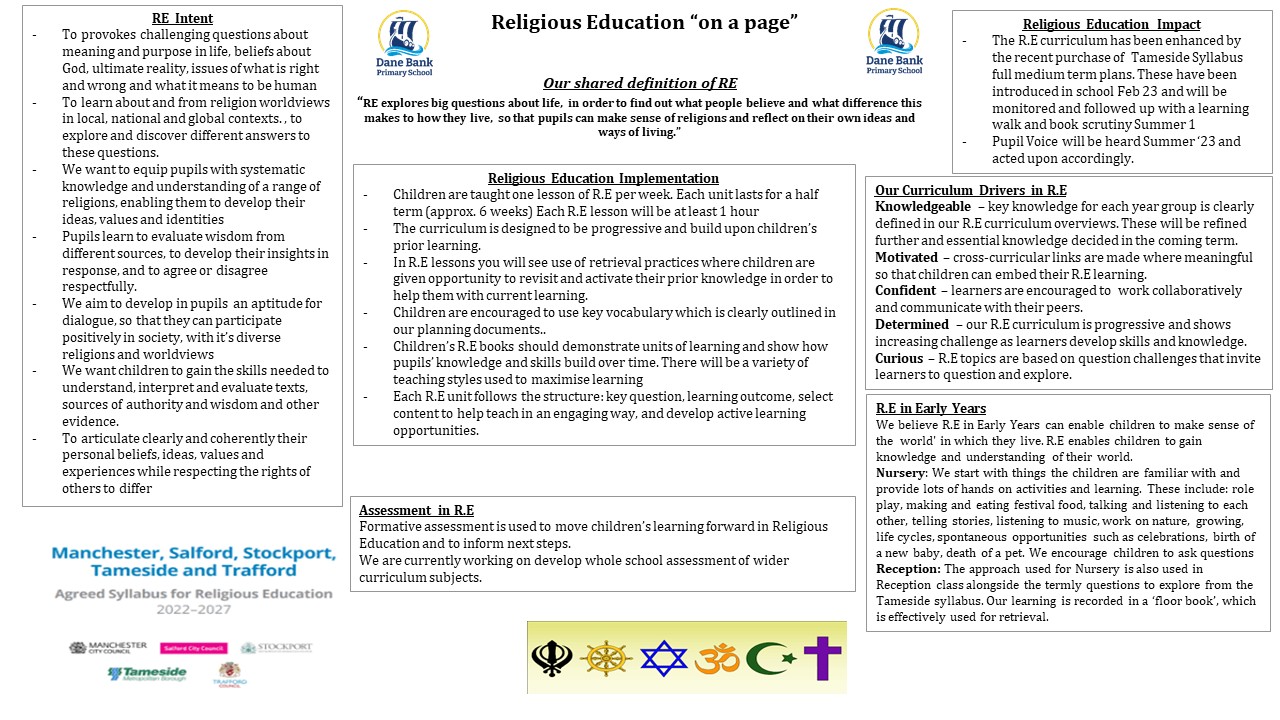Religious Education
Our Religious Education curriculum is a bespoke curriculum developed using two main documents: The Focus Education RE Learning Challenge Curriculum and the Tameside Agreed Syllabus for Religious Education. We use these two documents to create a bespoke Religious Education curriculum that we feel meets the needs of our pupils and focuses on the most relevant issues and concepts fort them.
Each year group covers 6 RE topics across the year. Each unit starts with an overarching enquiry question which is then broken down in to supplementary questions that guide each lesson.
Our aim is that the knowledge and skills developed through the RE curriculum contribute to pupils’ readiness to participate in life in modern, diverse Britain.
Through our Religious Education curriculum, we want:
- Our children to become literate and articulate about religions and beliefs, and to be thoughtful members of a plural society, so that in learning from religion they are able to make informed choices about how they want to live their lives whilst also understanding more about the faith of other people they meet.
- Pupils to develop rich knowledge of religions and worldviews and use this to increase their levels of religious literacy and conceptual understanding.
- Pupils to be able to articulate, with confidence, their own positions and ideas about religion, beliefs and spirituality – and then to change their minds, if they choose to do so.
- To promote social and ethnic harmony through the exploration of multiple identities and local communities, through visits to places of worship and meeting people from diverse communities of religion and belief, and through a deepening understanding of beliefs and practices.
- Our pupils to develop informed and empathic understandings of different groups which will help promote cohesion and integration.
- To encourage children to explore British values in relation to religion and worldviews.
Religious Education "Subject on a Page"

Religious Education Long Term Plan
Religious Education Knowledge Overviews
Our Religious Education Knowledge Overviews outline the key substantive knowledge planned within each unit:
Reception RE Knowledge Overview
Religious Education in Early Years
Click here to see how Religious Education works alongside the Early Learning Goals.
We believe that activities children engage in during their Nursery years are experiences which provide the building blocks for later development. Starting with things which are familiar to the children and providing lots of hands-on
activities and learning are important parts of pupils’ learning at this stage.
We include elements of Religious Education in our Nursery curriculum through: creative play, make-believe, role play, dance and drama; dressing up and acting out scenes from stories, celebrations or festivals; making and eating festival food; talking and listening to each other; hearing and discussing stories of all kinds, including religious and secular stories with themes such as goodness, difference, the inner world of thoughts and feelings, and imagination; exploring authentic religious artefacts, including those designed for small children such as ‘soft toy’ artefacts or story books; seeing pictures, books and videos of places of worship and meeting believers in class; listening to religious music; starting to introduce religious terminology; work on nature, growing and life cycles or harvest; seizing opportunities spontaneously or linking with topical, local events such as celebrations, festivals, the birth of a new baby, weddings or the death of a pet; starting to talk about the different ways in which people believe and behave, and encouraging children to ask questions.
In Reception, the children begin to work on specific units that follow the 3 strands used throughout the syllabus: Believing, Expressing, Living. Their units of learning are shown on the curriculum overview below.
Inclusion in Religious Education

Oracy in Religious Education
Religious Education - Curriculum Impact
Should you have concerns regarding your child's participation in Religious Education lessons and/or wish to exercise your right to withdraw your child from these lessons, please contact the Headteacher to discuss this.

